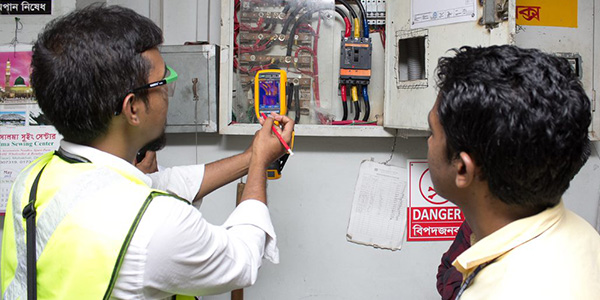Binding Safety Accords Transform Death Traps into Safe Factories
 Bangladesh is the third largest exporter of apparel to the US. Its garment sector accounts for more than 80 percent of the country’s exports and employs over four million workers. These workers face some of the worst conditions in the industry, including poverty wages, verbal and physical harassment, retaliation for advocating for better conditions, and extremely unsafe factory buildings.
Bangladesh is the third largest exporter of apparel to the US. Its garment sector accounts for more than 80 percent of the country’s exports and employs over four million workers. These workers face some of the worst conditions in the industry, including poverty wages, verbal and physical harassment, retaliation for advocating for better conditions, and extremely unsafe factory buildings.
From 2005 to 2013, these unsafe conditions tragically killed nearly 2,000 Bangladeshi workers in fire and building safety disasters—all of which could have been prevented. In April 2013, 1,134 workers alone died when the Rana Plaza building collapsed, making it the worst disaster in the history of the industry. Factories at Rana Plaza were producing for several major brands and retailers, including JCPenney, The Children’s Place, and Walmart. Many of these companies had audited the factory in the months leading up to the collapse—yet these audits failed to identify or correct the safety violations that would lead to disaster.
The WRC's Role
The WRC plays a critical role in implementing and enforcing the Accord. As a witness signatory on the Accord Steering Committee, the WRC works with the Steering Committee members to ensure the principles of the Accord are being fully executed and that inspections and repairs are taking place in a timely fashion.
The Accord Today
Nearly 200 brands and retailers signed the 2018 Accord, which extended the original agreement for an additional three years. Signatory brands included three of the world’s four largest fashion retailers—H&M, Inditex, and UNIQLO. Together, these brands source from more than 1,600 factories in Bangladesh, which collectively employ over two million workers.
Inspections at these factories uncovered over 140,000 safety violations, ranging from structural damage to unsafe fire escape routes. To date, most of these safety hazards have been eliminated.
On June 1, 2020, the Bangladesh office of the Accord transitioned its functions to a recently established local organization, the Ready-Made-Garment Sustainability Council (RSC). While the RSC was set up to be, going forward, the implementing agent of the Accord’s prescribed safety programs in Bangladesh, it was never intended to replace the Accord agreement itself; the brand obligations under the Accord Agreement remained in effect and unchanged until the Agreement’s expiration on August 31, 2021—after the conclusion of a three-month extension.
Unions and labor rights advocates proposed a binding successor agreement to continue the Accord model in Bangladesh—where it has averted hundreds, probably thousands, of worker deaths and where many factories still need renovations—and expand the model to other countries such as Pakistan where garment workers' lives are routinely put at risk.
The successful outcome of negotiations in the summer of 2021 has ensured that the sweeping gains the Accord has delivered in Bangladesh will be maintained and extended. This new 26-month international safety agreement, which went into effect on September 1, 2021, maintains the vital elements of the ground-breaking model established by the Bangladesh Accord: legal enforceability of brands’ commitments, independent oversight of brand compliance, the obligation to pay prices to suppliers sufficient to support safe workplaces, and the obligation to cease doing business with any factory that refuses to operate safely. One hundred ninety-nine apparel companies had signed the International Accord for Health and Safety in the Textile and Garment Industry by November 1, 2023, when a new agreement went into effect, which companies are now invited to sign: More than 260 have done so. This model, which has saved countless lives in Bangladesh, will also now be expanded to other countries where workers’ lives remain daily at risk.
On December 14, 2022, signatories to the International Accord announced a decision to expand the Accord to Pakistan. More than 130 companies have now signed the Pakistan Accord. Please visit here to access the up-to-date list of signatories.
